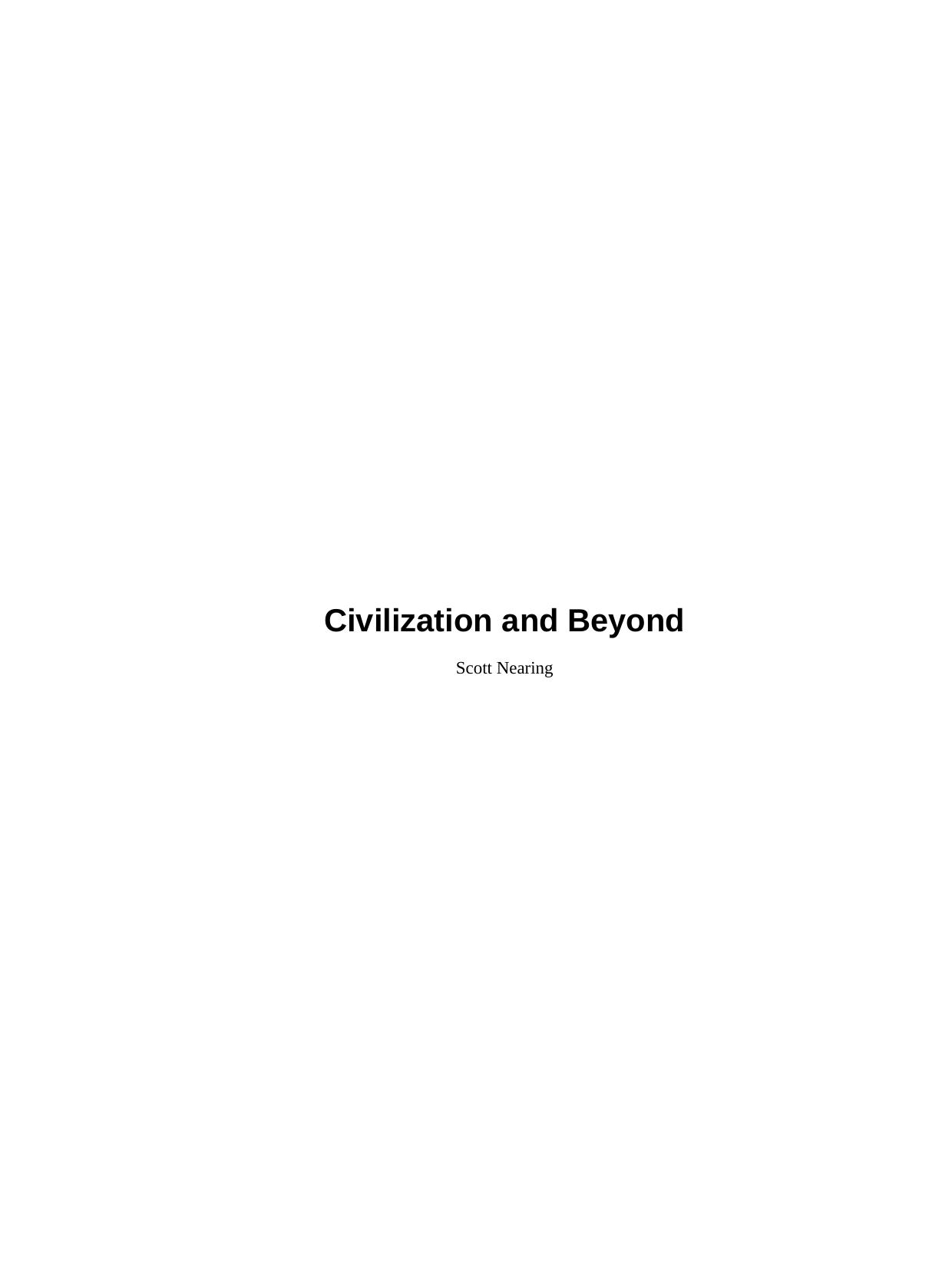Civilization and Beyond by Scott Nearing

Author:Scott Nearing
Language: eng
Format: epub, pdf
Publisher: Pronoun
CHAPTER NINE
..................
IDEOLOGIES OF CIVILIZATION
This study was laid out along inductive lines: an examination of the facts with such generalizations as the facts suggest or justify. We began our social analysis of civilization by presenting noteworthy facts concerning the politics, economics, and sociology of various civilizations. In the present chapter we deal with their ideologies.
We are accepting and following the fourth variant definition of “ideology” presented by Webster’s New World Dictionary: “The doctrines, opinions or way of thinking of an individual, class, etc.” In this case we are reporting on the doctrines, opinions, thought forms and action patterns of entire civilizations.
Our concern is not with the doctrines, opinions and ways of thinking and acting advanced by elite minorities. Such an approach would involve a study of comparative ideologies. Rather we are asking what civilized peoples were trying to do, as measured by their political, economic and sociological activities, programs and purposes.
It may be presumptuous for an individual to generalize about civilizations of which he knows so little. On the other hand, if we recognize the limitations under which all assumptions and generalizations operate it is possible and often helpful to assume and generalize, although the generalizations may be no more than interim reports, subject to later amendment, correction or rejection.
What were the prevailing ideas of civilizations and what ideas were put into practice? What purposes dominated and directed the lives of civilized peoples? How successful have civilized peoples been in achieving their objectives?
At the outset we must realize that in any complex society there are wide ranges of ideology, from the body of ideas held by small uninfluential sects to the purposes, ideas, policy declarations and actions of governing oligarchies. We do not wish to defend or attack the ideas, but to summarize them and understand them in a way that will give a group picture of the purposes, ideas, policies and day-to-day activities of the civilizations in question. For convenience in our discussion we will take up, first, civilized societies as collectives, and then the operation of civilized ideology as expressed in the lives of individuals.
Presumably the most immediate purpose of all civilized peoples has been survival, getting on as a collective or group from day to day, through summer and winter, under normal conditions, and/or in periods of stress and emergency. If the group cannot survive it loses its identity, breaking up into the self-determining parts of which it is composed.
Survival means continued existence as a group—in the face of disruption from within or attack and invasion from without. The group which survives continues to exist and to act as a group that maintains the common defense and promotes the general welfare.
Each social group competing for survival has a sense of its own identity and a belief in its capacity to survive. This ideology is strengthened by the belief that the group has special qualities and is protected by powerful entities that will guarantee its success in the survival struggle. The group considers itself better qualified to survive than neighbor groups.
Download
This site does not store any files on its server. We only index and link to content provided by other sites. Please contact the content providers to delete copyright contents if any and email us, we'll remove relevant links or contents immediately.
| Africa | Americas |
| Arctic & Antarctica | Asia |
| Australia & Oceania | Europe |
| Middle East | Russia |
| United States | World |
| Ancient Civilizations | Military |
| Historical Study & Educational Resources |
Cecilia; Or, Memoirs of an Heiress — Volume 1 by Fanny Burney(32558)
Cecilia; Or, Memoirs of an Heiress — Volume 2 by Fanny Burney(31956)
Cecilia; Or, Memoirs of an Heiress — Volume 3 by Fanny Burney(31942)
The Secret History by Donna Tartt(19088)
Sapiens: A Brief History of Humankind by Yuval Noah Harari(14389)
Leonardo da Vinci by Walter Isaacson(13336)
The Radium Girls by Kate Moore(12028)
Sapiens by Yuval Noah Harari(5370)
How Democracies Die by Steven Levitsky & Daniel Ziblatt(5219)
The Wind in My Hair by Masih Alinejad(5095)
Homo Deus: A Brief History of Tomorrow by Yuval Noah Harari(4918)
Endurance: Shackleton's Incredible Voyage by Alfred Lansing(4783)
Man's Search for Meaning by Viktor Frankl(4606)
The Silk Roads by Peter Frankopan(4534)
Millionaire: The Philanderer, Gambler, and Duelist Who Invented Modern Finance by Janet Gleeson(4478)
The Rape of Nanking by Iris Chang(4213)
Joan of Arc by Mary Gordon(4110)
The Motorcycle Diaries by Ernesto Che Guevara(4101)
Stalin by Stephen Kotkin(3965)
